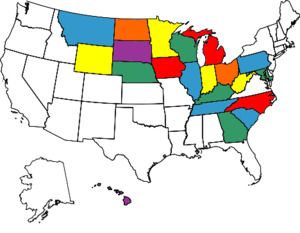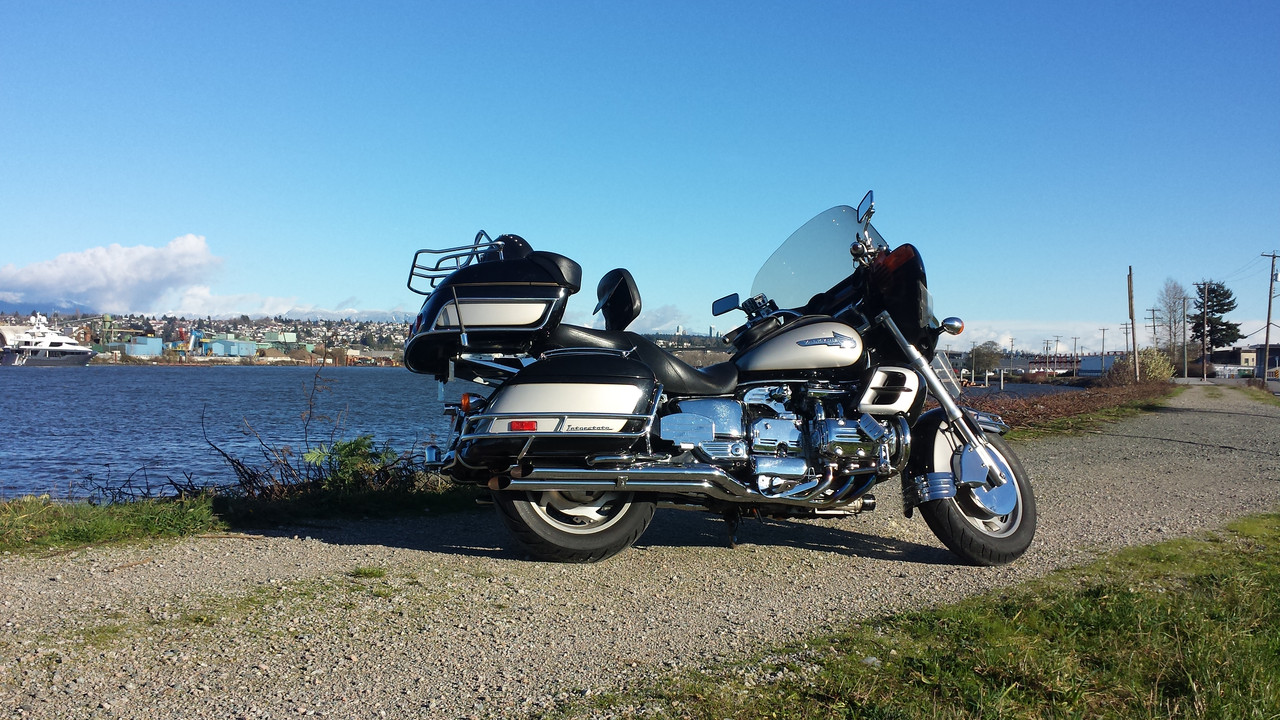|
alph
|
 |
« on: January 01, 2012, 05:29:04 AM » |
|
The other day I changed the oil in my cycle, and I was going to switch to a lighter synthetic oil instead of the usual Amsoil 20w50 that I use. I’ve been wondering if anyone else has noticed an improvement in fuel mileage by using a “thinner” (not weaker) oil? I usually get about 30-32 mpg and a buddy of mine (NITRO) gets up to 35-38 mpg. I don’t quite know what oil he uses, but I was wondering if it would make a difference in MPG?
Oh, and who ever posted that video of Jay Leno talking about Evans Antifreeze, thanks, I’ll probably be changing that this week also.
|
|
|
|
|
 Logged
Logged
|
Promote world peace, ban all religion. Ride Safe, Ride Often!!   |
|
|
|
Jess from VA
|
 |
« Reply #1 on: January 01, 2012, 06:12:30 AM » |
|
I don't know about better mileage, but if you can afford Amzoil, I'd use their 10-40 synthetic motorcycle oil, instead of 20-50..... especially in southern Kanukistan where you live.
|
|
|
|
|
 Logged
Logged
|
|
|
|
|
alph
|
 |
« Reply #2 on: January 01, 2012, 06:41:30 AM » |
|
southern Kanukistan where you live.
 not by choice buddy!! |
|
|
|
|
 Logged
Logged
|
Promote world peace, ban all religion. Ride Safe, Ride Often!!   |
|
|
|
Ricky-D
|
 |
« Reply #3 on: January 01, 2012, 07:04:37 AM » |
|
Changing oil to gain miles per gallon is pie in the sky and too thin an oil could be a bad thing for these old motors. Just like too thick an oil also!
***
|
|
|
|
|
 Logged
Logged
|
2000_Valkyrie_Interstate
|
|
|
|
98valk
|
 |
« Reply #4 on: January 01, 2012, 09:07:57 AM » |
|
amsoil 10w30/30HD diesel oil. Just did an oil analysis after 2 yrs and 8k miles. report came back normal wear and oil was still good for continued service. This oil has always been spec'd for wet clutch transmissions, such as allison.
slight mpg gain, runs cooler.
studies do show that any 20w50 oil will run slightly hotter than a thinner oil, thicker viscosity creates more friction, we're talking a few degrees here which during high speed, high load, high ambient conditions will be 5+ degrees higher.
going from a 20w50 to a 10w40 or 15w40 will increase mpg.
+1 on the evans, have it in the valkyrie for over 10 yrs now.
|
|
|
|
|
 Logged
Logged
|
1998 Std/Tourer, 2007 DR200SE, 1981 CB900C 10speed
1973 Duster 340 4-speed rare A/C, 2001 F250 4x4 7.3L, 6sp
"Our Constitution was made only for a Moral and Religious people. It is wholly inadequate to the goverment of any other."
John Adams 10/11/1798
|
|
|
Tundra
Member
    
Posts: 3882
2014 Valkyrie 1800
Seminole, Florida
|
 |
« Reply #5 on: January 01, 2012, 12:48:24 PM » |
|
When I bought my Valkyrie I would get between 29mpg-35mpg. Of course my riding style was more aggressive. I thought the stories of 38mpg-41mpg were bunk. I now get regularly 37mpg-40mpg, my best milage ever being 41.1 mpg. I can attribute my improved milage to years of playing with my carbs, adjusting pilots, cleaning carbs, synchronized carbs, running non-ethanol fuel, changing my exhaust, adding mufflers, proper air pressure in tires and most of all my mellower riding style. My mellow riding style came from watching ALL of my local riding buddies wind up in the hospital or dead in a 3-4 year time frame. Contrary to popular belief, my best milage is two-up with gear. I attribute that to again a more cautious ride for the concern of my wifes safety. My biggest milage gains have been by adjusting my wrist.  But seriously, oil? Who'da thunk it? |
|
|
|
« Last Edit: January 01, 2012, 01:28:43 PM by Tundra »
|
 Logged
Logged
|
If you can't be a good example: be a WARNING!!
|
|
|
|
The Anvil
|
 |
« Reply #6 on: January 01, 2012, 01:31:22 PM » |
|
Any mileage gain by switching to a lighter weight oil will be minimal. A lighter weight oil WILL cause less parasitic HP loss by reducing the amount of work the oil pump has to do but it's not going to save you much in fuel and the thinner viscosity could possibly offer less protection. It's not a trade-off worth making. But as someone said, 20W50 (or 15W50) might be a bit heavier than necessary in your colder climate. You should be just fine with 10W40 or even 10W30 during colder months.
I will say that I've been impressed with the durability of some of the very low viscosity oils that many manufacturers are recommending these days. But these are being used in newer engines that are designed for it.
|
|
|
|
|
 Logged
Logged
|
Boxer rebellion, the Holy Child. They all pay their rent.
But none together can testify to the rhythm of a road well bent.
Saddles and zip codes, passports and gates, the Jones' keep.
In August the water is trickling, in April it's furious deep.
1997 Valk Standard, Red and White.
|
|
|
|
98valk
|
 |
« Reply #7 on: January 01, 2012, 02:05:23 PM » |
|
Any mileage gain by switching to a lighter weight oil will be minimal. A lighter weight oil WILL cause less parasitic HP loss by reducing the amount of work the oil pump has to do but it's not going to save you much in fuel and the thinner viscosity could possibly offer less protection. It's not a trade-off worth making. But as someone said, 20W50 (or 15W50) might be a bit heavier than necessary in your colder climate. You should be just fine with 10W40 or even 10W30 during colder months.
I will say that I've been impressed with the durability of some of the very low viscosity oils that many manufacturers are recommending these days. But these are being used in newer engines that are designed for it.
FYI owners manual allows 10w30 upto about 95 degrees new gl1800 recomends 10w30 all of the time, basically same engine except for the chain drive cams. oil is so much much better today than when the first GWs and GL1500 came out. oil analysis proves this out. |
|
|
|
|
 Logged
Logged
|
1998 Std/Tourer, 2007 DR200SE, 1981 CB900C 10speed
1973 Duster 340 4-speed rare A/C, 2001 F250 4x4 7.3L, 6sp
"Our Constitution was made only for a Moral and Religious people. It is wholly inadequate to the goverment of any other."
John Adams 10/11/1798
|
|
|
|
The Anvil
|
 |
« Reply #8 on: January 01, 2012, 02:07:20 PM » |
|
oil is so much much better today than when the first GWs and GL1500 came out.
oil analysis proves this out.
Absolutely. |
|
|
|
|
 Logged
Logged
|
Boxer rebellion, the Holy Child. They all pay their rent.
But none together can testify to the rhythm of a road well bent.
Saddles and zip codes, passports and gates, the Jones' keep.
In August the water is trickling, in April it's furious deep.
1997 Valk Standard, Red and White.
|
|
|
gordonv
Member
    
Posts: 5763
VRCC # 31419
Richmond BC
|
 |
« Reply #9 on: January 01, 2012, 04:01:13 PM » |
|
I drove my Shadow 1100 for 5K KM the first year I bought it, consitantly got 175KM to reserve, on a daily driver.
New season, changed the oil to the Amsoil 10W-40 Synthetic, and went up to a consistant 189KM to reserve, and this was over 10K KM.
That was (if I have the #'s right) a 7% increase in fuel economy. Not bad at all for a once a year oil change, at a higher cost, but an extra 15KM per tank distance is quite nice.
|
|
|
|
|
 Logged
Logged
|
1999 Black with custom paint IS   |
|
|
|
RP#62
|
 |
« Reply #10 on: January 01, 2012, 04:51:18 PM » |
|
For what its worth, the government is saying on average, a 1.5% increase in fuel economy can be expected with lighter weight oils.
-RP
2.2 FUEL ECONOMY EFFECT OF OILS
There is a large volume of literature on the effect of oil properties on engine friction and on vehicle fuel economy. Much of the literature, however, focuses on specific oil properties and additives, and the literature on the relationship between commercially available oil formulations and vehicle fuel economy is more limited. Most of the current literature compare the benefits of oils using 5W-30 as the reference base, since this oil is the factory fill oil for most light-duty vehicles since the early l990s. Papers from the early-19805 have compared the performance of 5W-30 oils against 10W-30 and 10W-40 oil, and have found benefits in fuel economy in the 1.2 to 2.0 percent range. In almost all cases, the testing was conducted under standard conditions such as the EPA test or the American Society of Testing and Materials (ASTM) Sequence VIA test. In general, these tests underestimate the benefits of low viscosity Oils to the consumer, as they do not involve testing at cold ambients where reduced viscosity benefits can be large. The benefits of 5W-30 oils over 10W-30/40 oils on more modern vehicles are in the same range, as confirmed in a 1995 paper by researchers Korcek and Nakada (from Ford and Toyota, respectively) which summarizes the benefits of alternative oil formulations.
Korcek and Nakada (Ref. 1) also provide preliminary data on the benefits of 5W-20 and OW-20 oils over 5W-30 oils. Charts in the paper suggest that a fuel economy benefit of one to two percent is possible, although the range shown was large due to differences in friction modifiers between the different oil formulations. A more direct comparison of two commercially available oils performances’ on popular vehicles is found in the paper by Tseregounis and McMillan (Ref . 2). The paper indicates that SAE 5W-20 engine oils demonstrate 1.0-2.2 percent (average 1.5 percent) FE gains over the SAE 5W-30 oils on several GM vehicles.
Most concerns with lower viscosity oils are associated with their effect on engine wear. Tanaka et al. (Ref. 3) from Honda address these concerns. They study the impact of using a OW-20 oil enhanced with a relatively common molybdenum based friction modifier. In their study, they compare the oil to a standard 5W-30 oil, with the same additive blends, both for FE benefit and engine durability. They conducted tests on a Honda engine and a Honda vehicle, and found an impact of 1.5 percent on FE with no significant difference on engine durability. At this moment, OW-20 oil is only available from select retailers at a price of over $8 per quart, as the Honda Insight is the only car for which this oil is explicitly recommended in the owner’s manual.
Kawai et al. (Ref. 4), researchers from Toyota, found that the fuel economy of in-use engines can be improved using SAE 5W-20 oils containing certain friction modifying additives by 1.5 percent on average, when compared with the FE achieved with a conventional SAE 5W-30 oil without these additives, They also found that, in new engines, the FE can be improved with the same SAE 5W-20 oil by 3.5 percent. An improvement of more than 1.5 percent was retained to 10,000 kilometers (relative to a conventional SAE 5W-30 Oil). These tests were done on a Toyota vehicle with a 2.2L, 4 cylinder, DOHC engine.
While it need not necessarily apply to all vehicles, it is encouraging that the 1.5 percent fuel economy benefit figure has been found to apply to GM, Honda and Toyota vehicles. Engine designs from these three manufacturers are reasonably representative of the universe of engine designs in modern cars.
|
|
|
|
|
 Logged
Logged
|
|
|
|
|
Robert
|
 |
« Reply #11 on: January 01, 2012, 06:38:40 PM » |
|
I second Rickys response  Also with the thinner oil dont forget the possibility of increased gear whine. |
|
|
|
|
 Logged
Logged
|
“Some people see things that are and ask, Why? Some people dream of things that never were and ask, Why not? Some people have to go to work and don’t have time for all that.”
|
|
|
|






